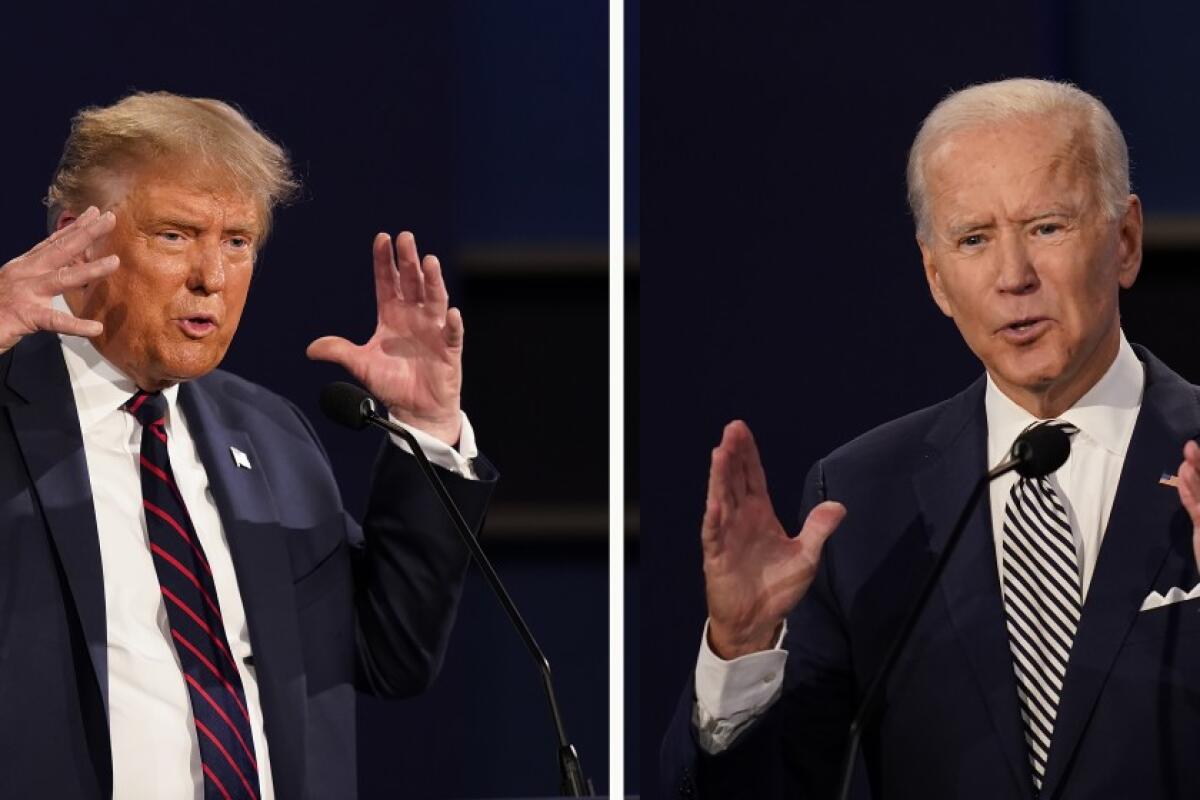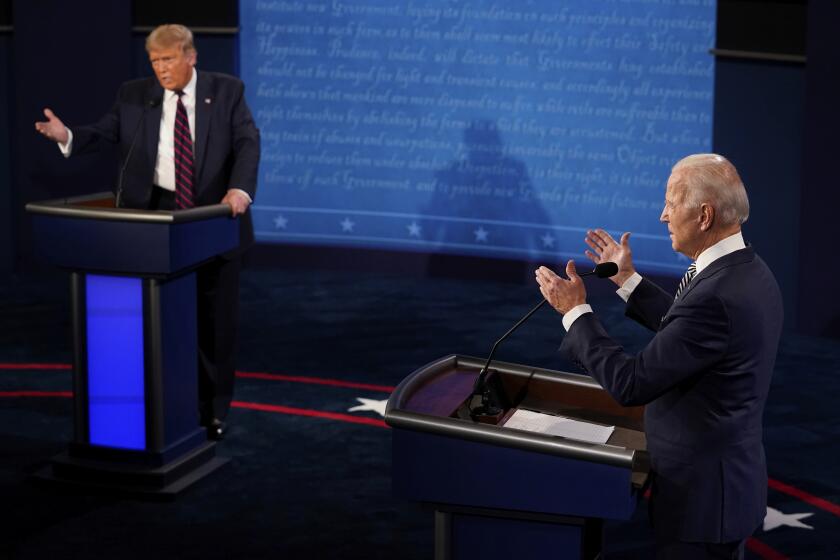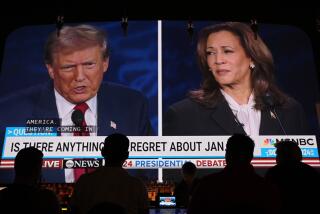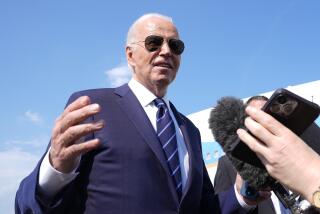Column: Biden holds off Trump in battle of insults

WASHINGTON — In 1858, Abraham Lincoln and Stephen A. Douglas made history with a series of lengthy, sober debates about the expansion of slavery and the future of the American republic. In 1960, John F. Kennedy and Richard M. Nixon made history with a series of lengthy, sober debates on the Cold War challenge of communism and the issue of civil rights.
On Tuesday evening, President Trump and Democratic presidential nominee Joe Biden may have made debating history again, but their achievement was of a different kind. The two candidates demolished and buried, at least for this election year, the last remnants of civil discourse in American politics.
They interrupted each other. They insulted each other. They talked over each other.
President Trump and former Vice President Joe Biden faced off in Cleveland in their first presidential debate.
“Will you shut up, man?” Biden said at one point, as Trump interrupted him for the umpteenth time. “This is so unpresidential.”
“There’s nothing smart about you, Joe,” the president said. “He graduated the lowest or almost the lowest in your class. Don’t ever use the word ‘smart’ with me.”
“You should get out of your bunker and get out of the sand trap and get [off] your golf course,” Biden said.
“You probably play more golf than I do,” the president said (falsely).
If Trump’s goal for the evening was to show voters that Biden, at 77, can no longer hold his own in a 90-minute debate, much less as president, he failed.
The former vice president turned Trump’s customary weapons of bluster and insult against the incumbent, who hasn’t been challenged so directly in public since his 2016 debates with Hillary Clinton.
It was Trump, not Biden, who looked off-balance and out of practice for much of the debate. He grew red in the face. He demanded extra time to answer, drawing sardonic rebuffs from the moderator, Chris Wallace of Fox News.
Biden was the competitor who appeared to have a strategy. He worked his way methodically through his campaign’s substantive talking points — principally, that Trump failed to meet the challenge of a pandemic that has killed more than 200,000 Americans and still has no coherent strategy to quell the public health crisis or improve America’s healthcare.
“He doesn’t have a plan,” Biden said. “The fact is, this man doesn’t know what he’s talking about.”
The president replied with talking points he has used all year. “It’s China’s fault,” he said of the pandemic. “We got the gowns, we got the masks, we’ve made the ventilators.”
And inevitably, he turned his fire on Hunter Biden, the Democratic candidate’s son, alleging that he had been given $3.5 million by the wife of the mayor of Moscow.
“Not true,” Biden replied — and then pivoted to a line he appeared to have prepared for that predictable moment: “This is not about my family or his family. It is about your family…. He doesn’t want to talk about what you need — you, the American people.”
“Then you shouldn’t have taken the money,” Trump fired back.
Future students of rhetoric will not use this debate as a model. Future students of American politics, on the other hand, may look on it as the culminating moment of a long decline of civil discourse in the age of Trump.
Biden has long been known for an almost quaint attachment to the bipartisan courtesies of an earlier age. During the Democratic primary season, he got into trouble with his party’s more militant wing by suggesting rhapsodically that if he were elected, Republican senators would experience “an epiphany,” and old-fashioned deal-making would come back into fashion.
In the face of his immediate challenge, which was to survive the first of three debates with Trump, that version of Biden appears to have been stashed in his basement.
The Biden who appeared Tuesday evening came ready for battle. He stammered a bit, as he often does. His sentences occasionally wandered. But he committed nothing that qualified as a gaffe.
More important for his campaign, he methodically delivered the substantive points he wanted to cover, from explaining his healthcare plans to claiming credit for saving the automobile industry a decade ago — often looking into the camera and addressing voters directly, ignoring the sputtering man to his right.
It was a largely moderate message designed to appeal to any remaining undecided voters, including women who voted for Trump in 2016 and manufacturing workers who have seen their industries slide into recession even before the pandemic, despite the president’s promises of an incipient boom.
The president, by contrast, often sounded as if he was speaking mostly to his already loyal base of support, the roughly 45% of voters who have remained with him throughout the campaign. He charged that a President Biden would fall under the sway of “radical Marxists,” claimed that progressive Democrats’ Green New Deal would outlaw cows, said increased crime was solely the fault of “Democrat mayors” and said of his opponent, “He will destroy this country.”
“I don’t support the Green New Deal,” Biden pointed out (accurately).
It seemed, much of the time, like a one-sided contest.
Debates rarely change an election campaign dramatically. More often, the candidate judged to be the winner picks up a modest bounce of two or three percent.
But those weren’t the stakes on the table Tuesday evening. Biden already appears to have the advantage in this race. The question was whether he would wilt under Trump’s pressure, and whether the president could use the moment to create an opening to build a majority.
By that measure, Biden won — and remains firmly in the lead, with less than five weeks to go.
More to Read
Get the L.A. Times Politics newsletter
Deeply reported insights into legislation, politics and policy from Sacramento, Washington and beyond. In your inbox three times per week.
You may occasionally receive promotional content from the Los Angeles Times.












